The unity government won both incumbent seats in the Johor by-elections of Pulai and Simpang Jeram last weekend.
The victories speak to the importance of the legacy of the late Salahuddin Ayub, whose memory was acknowledged by those who voted his Amanah colleagues into office.
A close look at the details of the voting shows that the victories should not be interpreted as strong endorsements of the Anwar Ibrahim-led unity government, and acceptance of the decision to withdraw the corruption charges against Umno president Ahmad Zahid Hamidi through the discharge not amounting to an acquittal (DNAA).
Many voters showed their dismay in how they voted (or chose not to vote).
My analysis of the results finds that the unity government continues to face serious electoral erosions of support compared to the 2022 general election, echoing the voting trends of political realignments of the Malay community and dealignment of the Indian community from Pakatan Harapan in the 2023 state elections last month, with persistent electoral vulnerabilities.
What particularly distinguishes these latest two by-elections from last month’s state elections is greater voter disengagement, a growing disappointment and cynicism with all options on offer.

At the same time, for those remaining to be politically engaged, the electoral relationship between Harapan and Umno shows greater consolidation as support for both coalitions has dropped.
This piece analyses the polling station results in the two by-elections by ethnicity and age cohorts, comparing the results with GE15 results gleaning statistical estimates from a method of ecological inference.
Using multiple lenses to interpret the election results deepens our understanding of the ongoing political shifts in voting behaviour.
Lower turnout: Broad voter disengagement
Voters are not voting to the same degree as in the past, even in a by-election.
Overall voter turnout dropped to 47 percent in Pulai and 61 percent in Simpang Jeram, 25 percent and 14 percent lower than in GE15 in these seats.
Pulai, in particular, has a considerable number of voters living outside, primarily working in Singapore. Yet the turnout drop is large and varies across groups, indicating that there is more going on than not being able to return to vote.
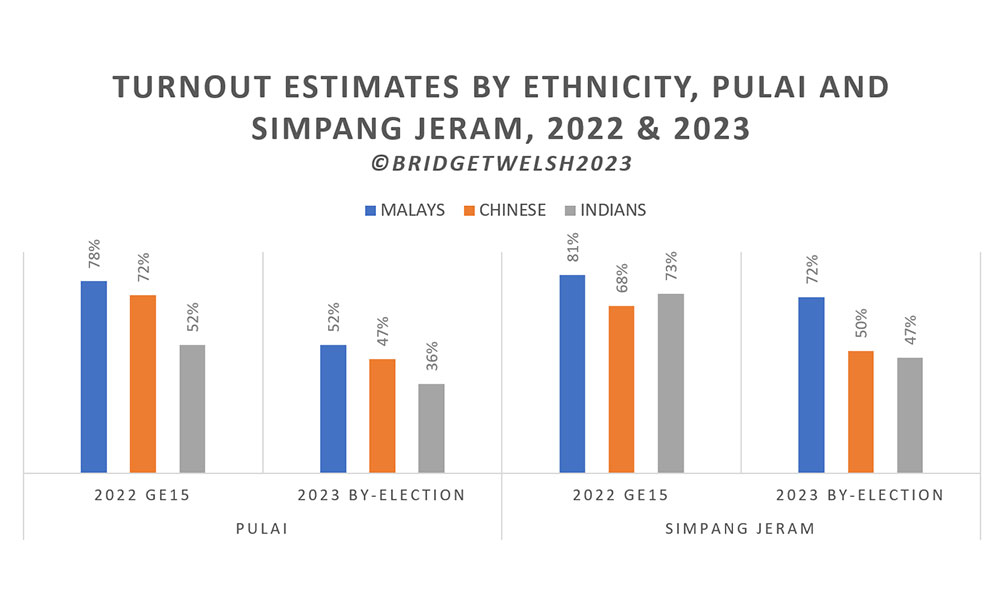
An ethnic lens on turnout shows recent usual patterns, a greater number of Malays vote compared to other communities with declines in across all the communities, as was evident in the six state election results.
In these by-elections, the turnout was lowest among Indians, reaching a shocking low of an estimated 36 percent in Pulai and less than half at an estimated 47 percent in Simpang Jeram.
Similarly, only half of the Chinese voters turned out to vote - an estimated 47 percent in Pulai and 50 percent in Simpang Jeram.
Non-Malays are increasingly disengaging from all political options. Given that these communities have made up the base of support for Harapan, this significant drop in turnout (estimated 30 percent/16 percent in Pulai of Chinese/Indian voters respectively, estimated 18 percent/26 percent in Simpang Jeram) indicates dissatisfaction.
Harapan’s traditional support base is eroding through voters not coming out to cast their ballots.
By comparison, Malay turnout was more varied, dropping an estimated 26 percent in Pulai and only an estimated nine percent in Simpang Jeram.
Here the differences in the number of outside voters, party machinery (PAS is stronger than Bersatu) and competitiveness of the polls shaped the differences between the two seats.
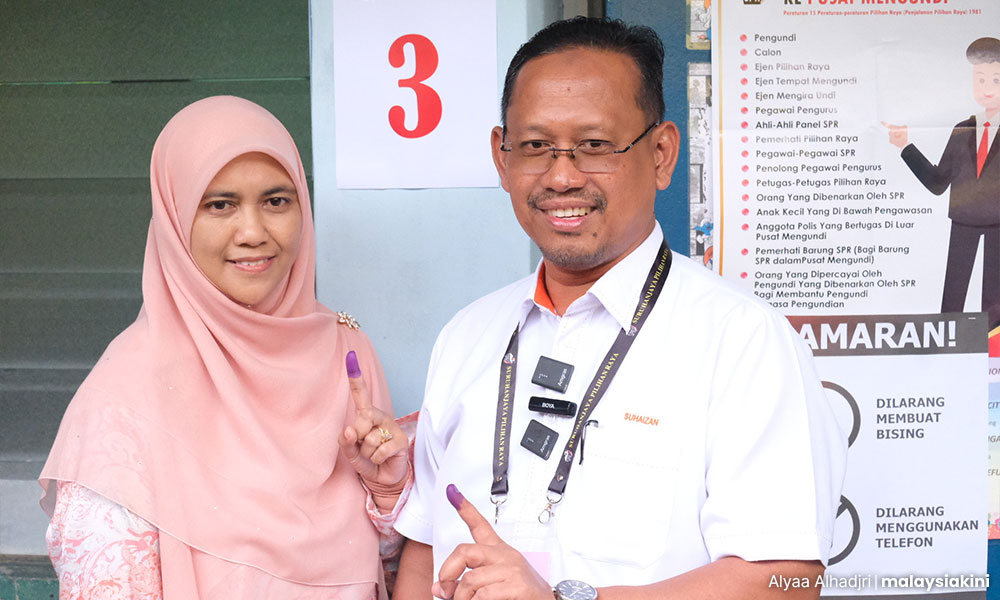
Yet, here too there is a decline in participation; one cannot ignore that voters from all communities are less electorally engaged than before.
The age cohort findings on turnout show that the least engaged are voters under 40. In Pulai, less than half of them voted - with only slightly above half of them voting in Simpang Jeram.
Even acknowledging that many of these younger voters are working outside, the low share of electoral participation among younger Malaysians speaks to a broadening disengagement - even disenchantment and cynicism - with all options on offer.
By any assessment of turnout, this is not an endorsement of Anwar’s unity government.
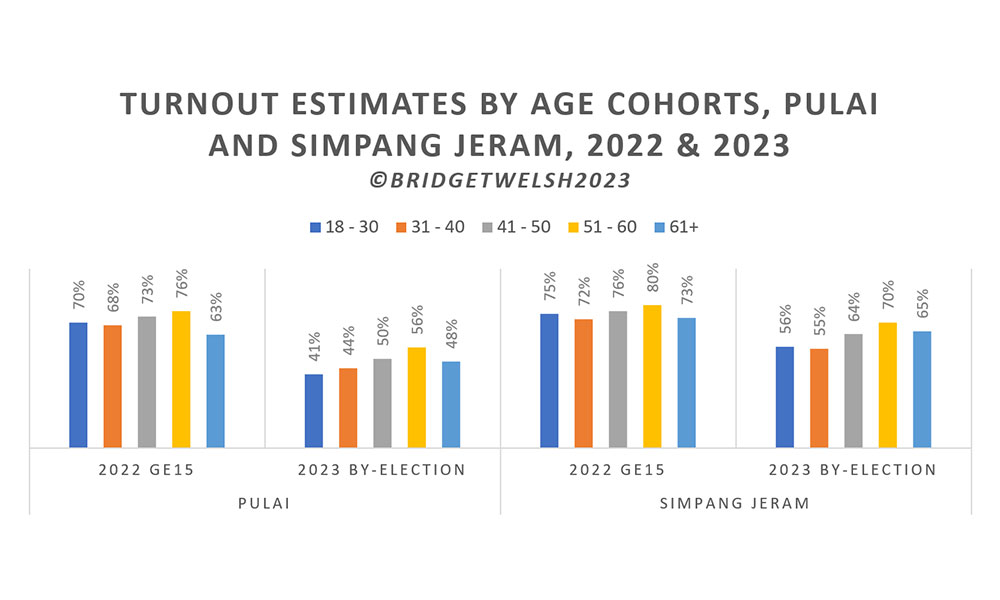
Ethnic voting: Continued ethnic polarisation, Malay realignment and Indian dealignment
The findings show persistent ethnic divisions in voting, especially between the Malays and Chinese voters.
Perikatan Nasional won the overwhelming support of Malay voters in these by-elections, an estimated 73 percent in Pulai and 69 percent in Simpang Jeram.
The unity government won the overwhelming majority of Chinese voters, an estimated 99 percent in both Pulai and Simpang Jeram.
PN is dependent on Malay support, while the unity government is dependent on Chinese support. These numbers are in line with voting patterns in the 2023 state elections, but extend the ethnic polarisation even further (with Chinese among voters who voted to an estimated 99 percent, up from 96 percent).
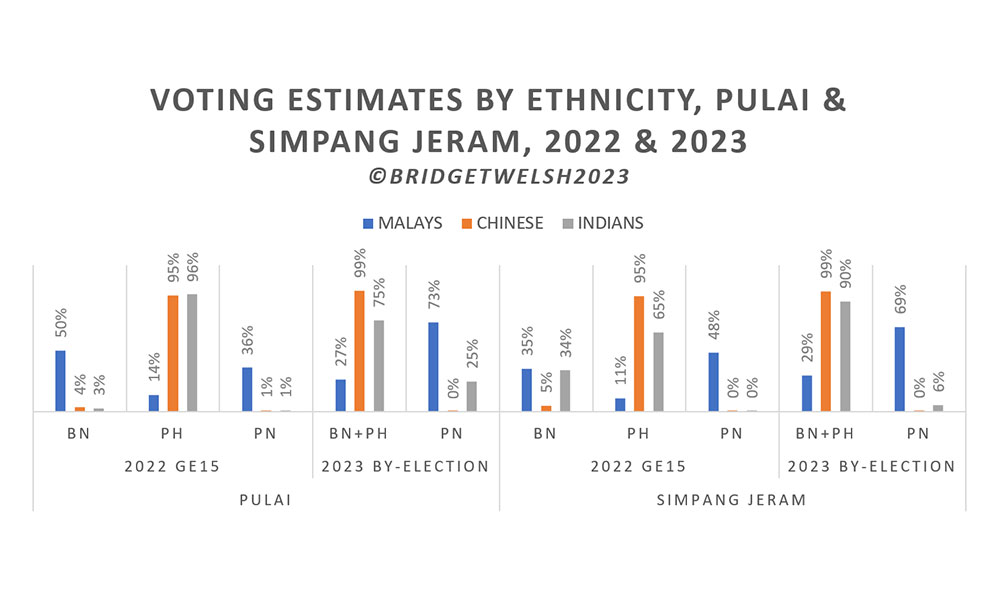
The vote of two ethnic communities, however, is changing. Taking the state elections and two by-elections together, the most comprehensive political realignment is occurring in the Malay community.
Malays do not support the unity government in high numbers and continue to abandon Umno. Looking at the polling station patterns to analyse crossover votes, my estimate is that the average crossover of Umno supporters to Harapan in both contests was only an estimated 20 percent average for both seats, with an estimated 80 percent average moving to PN.
In fact, among Malays, Harapan also lost support in the by-elections, with an estimated 25 percent average in the seats.
Given that combined, the unity government won only an estimated 27 percent of the Malay vote in Pulai (compared to an estimated 64 percent combined in GE15) and only an estimated 29 percent in Simpang Jeram (compared to an estimated 46 percent combined in GE15), the Malay support erosion remains significant and impacting both coalitions in the unity government.
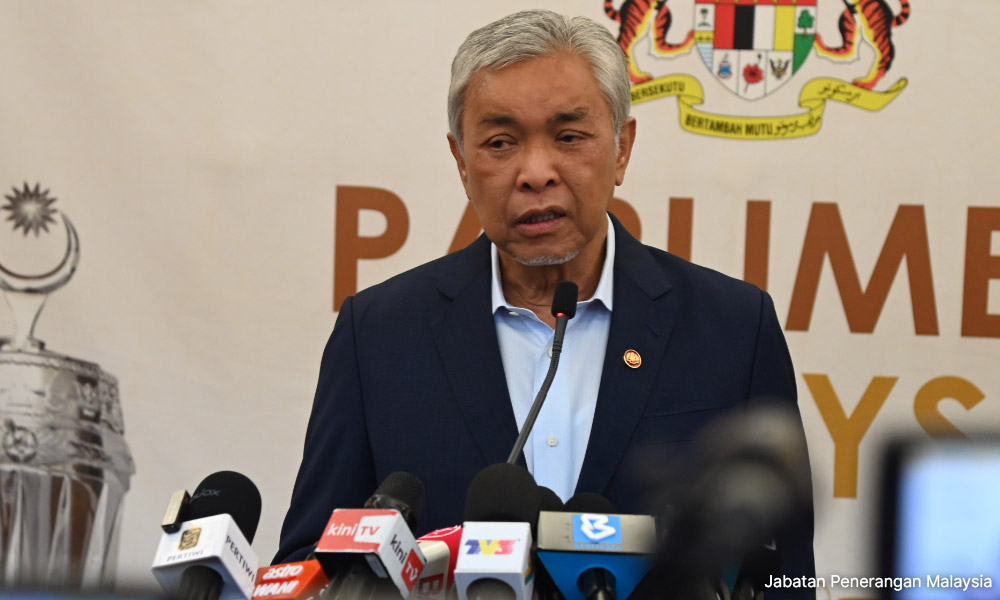
While my detailed analysis of the 2023 six state elections results remains ongoing, this share of average crossover from Umno and Harapan to PN is higher than the average transferability in Selangor and Penang, a worsening of Malay support in the west coast of Malaysia. The bleeding of Malay support for the unity government continues.
Contrary to some interpretations that after Zahid’s DNAA, Umno’s support base would strengthen, the detailed analysis of the results shows that the opposite is happening; Malays are leaving both Umno and Harapan.
The only positive for the unity government is that the overall share of the Malay vote that PN won has not increased significantly from the share in the state elections, suggesting that its support levels may be plateauing.
The effect is that the electoral relationship between Umno and Harapan has strengthened. The estimated 20 percent average of Umno support that did transfer to Harapan was important for the unity government in securing both by-election victories.
There is a growing electoral co-dependence between Umno and Harapan; the two peninsula-based coalitions in the unity government increasingly need each other to win elections as the by-elections show.
“Unity” electoral cooperation is now needed to hold onto many of the seats they do have. The chances of winning new seats based on these voting patterns are limited.
As Malays realign, Indians are de-aligning politically. Not only are more Indians not coming out to vote, but they are also changing loyalties.
In Pulai, there was a 21 percent drop in support for the unity government - again not insignificant, especially when Indians comprised 12 percent of the vote.
In Simpang Jeram, where the Harapan campaign more actively engaged Indian voters, there was a crossover in support for Harapan among Indians from BN, with the majority of Indians supporting the unity government.
Yet, here too, PN gained Indian support, an estimated six percent, lower than an estimated 25 percent in Pulai. What is happening is more Indians are leaving the unity government, a trend in the six state elections that continues.
Ongoing shifts by age
A generation lens of voting shows that the unity government relies more on older voters, which PN draws from younger voters; a trend evident since GE15.
The recent Johor by-elections point to a trend that also is evident in the state polls, more older voters moving away from the unity government compared to the past, as part of the broader political realignment discussed above.
What is happening is that the unity government is now facing the same problem that Umno faced as its power eroded, less electoral viability as the electorate becomes increasingly younger, with voters less likely to vote for it.
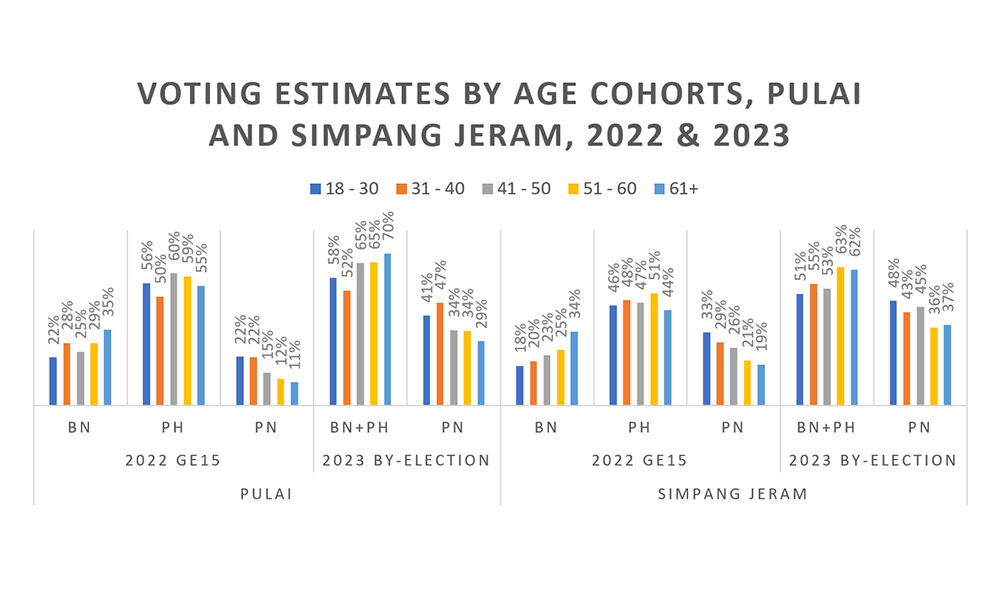
These shifts along ethnic and generation lines are not new. Harapan and Umno lost considerable ground in both seats. Arguably, had the seats not been those of the late Salahuddin, the results may have been different, especially in Simpang Jeram.
The by-elections point to the persistence of deep-seated electoral problems for the unity government coalitions, which now need each other more than ever; even to hold on to the seats they do have.
The Johor by-elections show rather than bringing strength to each other, the unity coalitions are becoming more dependent on each other at a time when the electorate is opting to disengage politically due to dissatisfaction.
For the opposition, while it has made gains among Malays and modest inroads among Indian voters, the Johor by-elections suggest that their support levels are plateauing, not increasing further.
Importantly, they continue to repel Chinese voters. Pulai and Simpang Jiram serve as a reminder that PN cannot govern Malaysia effectively with just the support of one community in Malaysia’s multiracial society.
Of all the voting shifts taking place, these Johor polls point to a different future of national politics, one with more disengaged from politics from political fatigue and loss of hope in political alternatives.
Time will tell whether this is temporary, or like the other trends of political realignment and dealignment taking place deepening.
If it is, Malaysia’s democracy is not only facing challenges from criminal charges being forgiven but also from voters who are less forgiving. - Mkini
BRIDGET WELSH is an honourary research associate of the University of Nottingham’s Asia Research Institute, a senior research associate at Hu Fu Center for East Asia Democratic Studies, and a senior associate fellow at The Habibie Centre. Her writings can be found at bridgetwelsh.com.
The views expressed here are those of the author/contributor and do not necessarily represent the views of MMKtT.



No comments:
Post a Comment
Note: Only a member of this blog may post a comment.